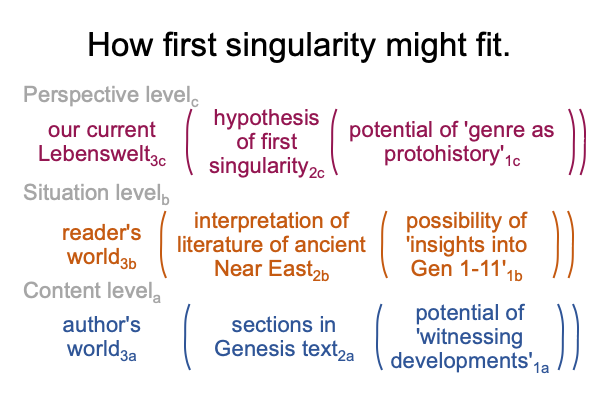Looking at the Book (2015) Genesis: History, Fiction or Neither? (Part 21 of 38)
0071 Gordon Wenham begins his interpretation of Gen 1-11 with the genealogies. The genealogies seem to be minor elements, since they do directly tell stories. However, they are significant as a genre.
Here is the virtual nested form in the realm of possibility.
genealogy1c( insights for reader1b( Biblical witness1a))
0072 To me, the principle of genealogy1c directs the reader1b to consider the possibilities inherent in a family tradition1a. The intended audience is the witness’s family.
0073 Wenham notices two obvious patterns.
Linear genealogies connect the generations.
Segmented genealogies make claims to territories or skills.
These topics, descent, territory and skills, must be relevant to the family.
0074 Also, there are less-obvious patterns. The number seven stands out, starting with the six days of creation and the seventh day of rest. Tens and twenties are also favored.
Are these relevant to the family’s pedigree, territory or skills?
In a world that is constantly and unpredictably specializing, who would be sensitive to repetitions of particular numbers?
May I guess?
The numbers have mystical significance.
What specialization might concern itself with mystical significance?
0075 I go back to the metaphor of a river, flowing through time, for the consequences of the first singularity. Gravity is a metaphor for the actualization of the potential for labor and social specialization. Eddies and whirlpools are metaphors for long-lived spontaneous structures, such as markets, temples and thrones. Spontaneous structures include associations of scribes, canal builders and maintainers, farmers, warriors and the like.
A family lives within one of these long-lived whirlpools. Each generation preserves the witness of the family through routinized stories about what the ancestors witnessed.
0076 Does that fit the definition of the term, “protohistory”?

